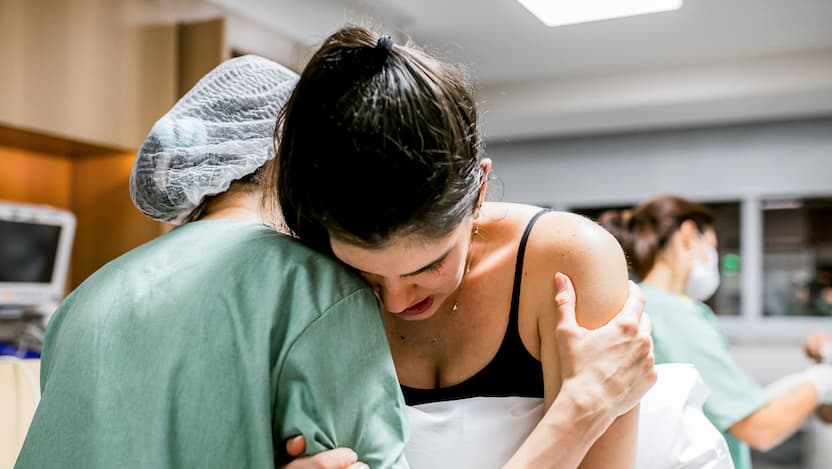Midwives in hospital settings: Understanding the benefits of choosing midwifery care

Certified nurse midwife helps a pregnant patient during labor
Certified nurse midwives are an increasingly common choice for individuals seeking safe and more personalized childbirth experiences. But there are often misunderstandings about the care midwives provide other than home births.
For example, experienced nurse midwives often find patients are surprised to learn that services may include prenatal care, in-hospital labor pain management, support during cesarean sections (C-sections), and even general gynecologic wellness care.
Midwife vs. OB/GYN
There are similarities and differences between midwives and obstetrician/gynecologists (OB/GYN). Certified nurse midwives are advanced practice nurses (APN) who have specialized training in prenatal care, labor and delivery, and postpartum care, as well as general gynecologic and reproductive wellness.
Like obstetrician/gynecologists, we often care for healthy individuals throughout their lives, addressing general gynecologic health, birth control, preconception planning, and pregnancy.
What is the difference between a midwife and an OB/GYN?
At the heart of midwifery is conversations. Through these dialogues, we aim to build trust, keep you informed about what is happening inside your body, and support you in exploring your options. This way, you have the support you need to make informed decisions about your care.
Unlike our OB/GYN partners, midwives do not perform surgeries. Other differences may include:
- Less intervention during labor: In fact, low-risk pregnancy studies have shown that midwifery care lowers the rates of C-sections and the use of vacuum or forceps for delivery.
- More time for education: Obstetricians balance time among patients at various risk levels. With our specialization in low-risk pregnancy care, midwives generally can dedicate more time to address your mind and body health holistically.
- Shared decision-making around treatment options: We review the risks and benefits of labor interventions — and not intervening — providing answers to your questions and addressing your concerns. We are your guidepost for accurate and thorough information so you can make your best choices. Ultimately, this is your body and your family — not ours.
Can you have both a midwife and an OB/GYN?
We recognize that midwives and physicians bring unique strengths to labor and delivery care. We recommend choosing which one makes you feel most comfortable for your labor and birth experience. Our midwife team will guide you through labor with phone consultations, hospital evaluations, and continuous support during your hospital stay.
While midwifery care aims to manage labor without obstetrician (OB) intervention, we believe in a collaborative approach. Our midwives and obstetricians work together seamlessly, following best practices and guidelines to consult with each other or even transfer care when necessary. Our shared goal is to ensure the best possible outcomes for you and your baby.
To make an informed decision about your preferred provider, consider meeting with both — a midwife and an OB. This way, you can choose the best specialist to provide care that feels right for you.
Midwife vs. Doula
What is the difference between a midwife and a doula?
Midwives and doulas have some overlap in the care they provide. Both are trained in labor support, but there are distinct differences between them too.
Doulas may come to your home both before and after you give birth in the hospital. While midwives may talk with you on the phone when you are at home, they only work with you in person at the hospital. Midwives are your provider for healthcare and ultimately are responsible for empowering you to make informed decisions about your healthcare.
Are doulas allowed at the Family Birth Center?
Yes, doulas are welcome as a member of your support team during labor. Midwives and doulas can work together to support you. Often, doulas help fill in the gaps when a midwife needs to step away from of the labor room.
Advantages of Midwifery Care in a Hospital Setting
If you choose a midwifery approach, you will see your midwife for prenatal care, and one of us will support you during labor and delivery. This means that a midwife will be with you throughout your entire birthing process.
Even if you did not see a midwife during your pregnancy but are interested in their advice or support in labor or postpartum, tell your nurses. If available, we would love to support you.
What is prenatal care like with a midwife?
Prenatal care comes in many forms and is adapted to what you need. Midwives support birth plans that involve either avoiding or including medication to manage labor discomforts, devoting ample time during appointments to discussing your planned approach and how we can help facilitate it.
We encourage parents and other loved ones to take prenatal classes and tour the birth center to be prepared for everything to the extent possible — from breastfeeding and infant CPR safety to proper car seat installation and sibling preparation.
How do midwives manage pain and facilitate labor?
Certified nurse midwives have experience using various tools to manage pain and facilitate labor. We use birthing and “peanut” balls to assist with position changes that can be critical for labor progress and pain management.
We may suggest hydrotherapy, aromatherapy, breath work, massage, counter pressure, and other ways to help ease labor pains. Additionally, medicines can be an option to support or facilitate labor. Anesthesiologists are readily available to help laboring patients, whether you have a midwife or an obstetrician managing your care.
Midwives also work closely with anesthesiologists if you choose an epidural for pain relief. We also remain in continuous contact with obstetricians in case a complication arises.
What is the relationship like between midwives and their patients?
There tends to be a special relationship between a birthing parent and their midwife. Some patients describe feeling an emotional connection when they hear their baby’s heartbeat for the very first time with their midwife. They also feel confident knowing that they can ask all their questions about why they feel the way they do during the pregnancy.
It is important to know that you have someone who supports and understands your plan for labor. This trusting relationship can lead to a healthier, calmer labor, reduce rates of postpartum depression, and may increase the chance of a normal spontaneous delivery. It can also help you to feel more empowered about your experience, regardless of the outcome.
How do midwives help patients after delivery?
Midwives can assist new parents with breastfeeding or chestfeeding and proper skin-to-skin bonding to promote healthy development for their newborn.
We see you every day postpartum during your hospital stay to check in about your recovery and readiness to return home. Traditionally, parents are advised to check in with their care team six weeks after the birth. We like to see our patients sooner, within one to two weeks. This allows us to quickly address any physical concerns or mental health conditions, such as postpartum depression.
We feel that it is especially important to check in sooner if you experience a rough labor. We focus on making sure that you are healing well, both in mind and body.
Can you have a midwife if you are not pregnant?
Yes. Whether you are planning a pregnancy or not, a midwife can still be your provider for your reproductive wellness care, such as annual exams, sexually transmitted infection (STI) testing, Pap smears and more. We also provide non-surgical care for reproductive problems like pelvic pain, vulvar infections, sexual health concerns, menstrual conditions, breast pain and more.
Do certified professional midwives attend births in hospitals?
Certified nurse midwives (CNMs) are key members of our hospital care team and attend births primarily in our hospital setting. They specialize in providing personalized, low-risk pregnancy and childbirth care while offering continuous support during labor. CNMs work closely with obstetricians and other specialists to ensure seamless, collaborative care, especially if complications arise. If you’re considering midwifery care at the University of Chicago Medicine, our comprehensive approach ensures you and your baby receive expert, compassionate support throughout your birthing experience.
Are midwives covered by insurance?
Midwifery care can be covered by most insurance plans, including Medicaid, at the University of Chicago Medicine. Certified nurse midwives provide a range of services, from prenatal care to postpartum support, that are typically included in healthcare coverage. To confirm your specific plan’s coverage, we recommend checking with your insurance provider or our financial services team for assistance.
Do midwives do sonograms, ultrasounds, or prescribe medication?
Certified nurse midwives (CNMs) at the University of Chicago Medicine can prescribe medications, including those for managing pregnancy-related symptoms, birth control, and other aspects of reproductive health. While midwives don’t typically perform sonograms or ultrasounds themselves, they frequently coordinate these diagnostic procedures as part of your care. If an ultrasound is needed, your midwife will work with our skilled imaging specialists to ensure you receive accurate results and clear next steps. This collaborative approach ensures personalized, comprehensive care tailored to your needs.

Elizabeth Oppert, MSN
Elizabeth Oppert, MSN, is an expert midwife with extensive knowledge and experience in pregnancy, childbirth and postpartum care.
Request an appointment with Elizabeth Oppert, MSN
